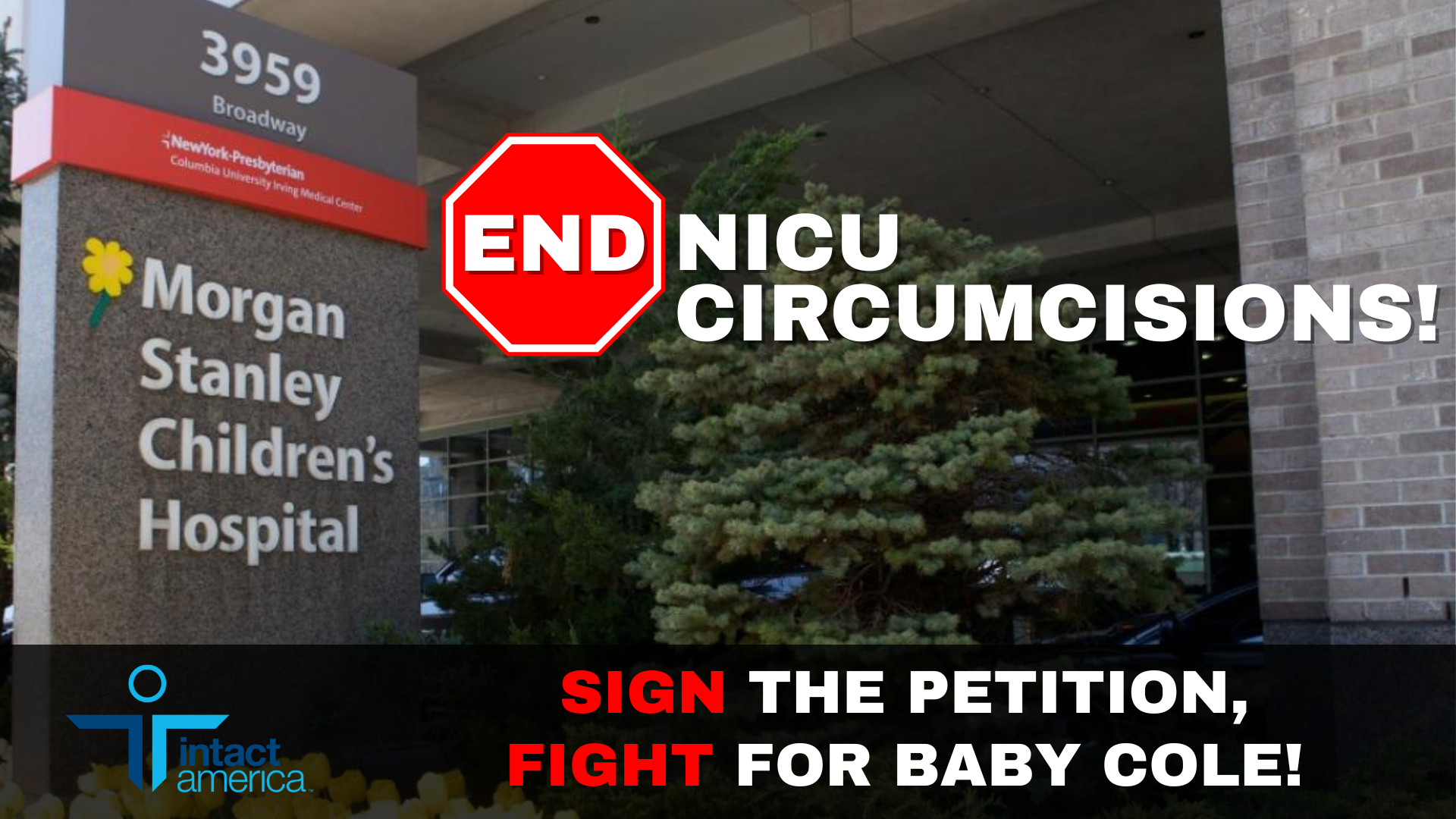INTACT AMERICA LAUNCHES CAMPAIGN TO CHANGE THE WAY THE NATION THINKS ABOUT MALE CIRCUMCISION
SORAYA MIRÉ, SOMALI WOMAN WHO FIGHTS TO END FORCED FEMALE CIRCUMCISION, JOINS CAMPAIGN TO PROMOTE INTACT BODIES FOR INFANT BOYS
PAINFUL, RISKY REMOVAL OF HEALTHY FUNCTIONING TISSUE VIOLATES HUMAN RIGHTS OF BABY BOYS WHO CANNOT GIVE INFORMED CONSENT
Tarrytown, NY—June 22, 2009
A group of parents, pediatricians, health activists, and human rights attorneys today announced the launch of a nationwide campaign to change the way America thinks about male circumcision, arguing that painful and medically unnecessary surgery to remove healthy genital tissue from non-consenting baby boys violates medical ethics and human rights.
Intact America – which unveiled its informational and advocacy website (www.intactamerica.org) at a Manhattan press conference – was joined by Soraya Miré, the Somali filmmaker and activist who has become a global leader in the fight against forced female circumcision.
“The same universal human right to an intact body that I have fought for on behalf of women and girls must apply to boys as well, especially those who are too young to make an informed decision about the integrity of their bodies,” said Miré. “We need to ask ourselves: How can it be wrong to surgically alter the genitals of a baby girl without her consent but okay to surgically alter the genitals of a baby boy?”
The Intact America campaign kickoff comes at a time when the Centers for Disease Control is reviewing studies of adult African male circumcision in the context of the HIV epidemic in Africa, with the goal of developing a recommendation to be released here in the United States.
“Studies of adult men in Africa cannot be used to justify subjecting non-consenting American baby boys to irreversible surgery that will remove healthy tissue from their genitals for the rest of their lives,” said Georganne Chapin, Executive Director of Intact America. “Let young men make decisions about their own bodies, when they reach an age to make that decision for themselves.”
“Before subjecting their newborn sons to painful, risky and irreversible genital surgery that is medically unnecessary, parents should ask themselves if they would do the same to their daughters,” said Chapin.
Chapin was also joined at the press conference by two physicians – Dr. Robert Van Howe, a pediatrician, from Marquette, MI, and his wife Dr. Michelle Storms, a family practice physician and Assistant Professor at the Michigan State University College of Human Medicine.
“Physicians have an obligation to look after the well-being of their patients. The child is the patient, not the parent. Neonatal circumcision is definitely not in the patients’ best interest,” said Dr. Van Howe, noting that the surgery yields more harm than benefit for the baby boy who cannot give informed consent. “It is a violation of the child’s most basic human rights, and a violation of a physician’s oath to do no harm.”
“As an adult, I can say yes or no based on informed consent,” said Dr. Van Howe. “An infant obviously cannot do that.”
Dr. Storms, who is also Research Director in the Family Medicine Residency Program at the MSU medical college, said she stopped performing circumcisions in 1988 when she could not ignore the fact that there was no medical justification for the surgery.
“I realized I was cutting off healthy tissue from a baby that couldn’t say no,” said Dr. Storms. “I wasn’t treating or diagnosing disease. It violated my sense of ethics and everything I was taught in medical school about my obligation to heal the sick and do no harm.”
“Clearly, circumcision is harming these infants,” Storms said. “Physicians should just say no to neonatal circumcision.”
Dean Pisani, a Texas businessman, made a $1 million commitment to assist Intact America’s campaign after he and his wife, who did not know the gender of their children before their births, were pressured by his wife’s obstetrician and doctors in Illinois hospitals to perform a circumcision if they had a son.
“My wife and I did our research and could find no rational or persuasive argument to subject a baby to surgery that had no medical benefit,” said Pisani. “We came under pressure from doctors prior to the birth of both of our children, but none could substantiate the medical necessity to perform the surgery. The pressure from doctors was both inappropriate and indefensible.”
Male circumcision is the most commonly performed surgery on infants in the nation, and one that is medically unnecessary.
The United States is the only industrialized nation (other than South Korea, which was influenced by the United States in the 1950s) that continues to circumcise a majority of baby boys for non-religious reasons, and it also has a higher rate of HIV infection than other industrialized nations.
If circumcision were an effective means to prevent potential HIV infection, logic would suggest that the U.S.’s high rate of male circumcision would yield a lower rate of HIV infection, but it does not. The only reliable means of preventing sexual transmission of HIV remains abstinence or use of a condom, not circumcision.
Approximately 75% of the men in the world are not circumcised and remain intact throughout their lives. Even in America, which continues to lead the industrialized world in male circumcision of infant boys, the rate of circumcision has dropped from 85 percent to less than 60 percent as parents learn facts that for years have gone unexamined. Intact America is working to promote awareness about the normal, intact body and the value of the male foreskin as a normal, sensitive and functional part of the body. The foreskin serves to protect the penis from injury and contamination, and also has a role in sexual pleasure, due to its specialized nerve endings and its natural lubricating function.
Doctors began routinely circumcising infant boys in the last decades of the 19th century, when it was viewed as a means to discourage masturbation, and the evils that were believed to be associated with masturbation. Claims over the years that circumcision prevents various diseases – including, in recent decades, sexually transmitted diseases – have been found to be mistaken or exaggerated.
The most common method of circumcision involves the infant being strapped to a board. In some cases, an analgesic is applied to the baby’s pubic area to somewhat lessen the pain, but many circumcisions are performed with no pain control at all. A metal instrument is used to forcibly separate the foreskin from the head of the penis, and the foreskin is then cut off. The surgery takes up to 15 minutes. The open wound it creates is exposed to urine and feces for several days as it heals. In addition to pain, the baby is subjected to the potential complications that accompany any surgery including, as occurs more than 100 times annually, complications leading to death.
Lesser but more common complications include abnormal bleeding, infection of the penis, scarring resulting from the removal of too much skin or, in rare cases, removal or subsequent loss of the entire penis. A case in point occurred recently in Georgia, where a family won a $2.3 million judgment after a botched circumcision accidentally removed a third of their son’s healthy penis.
No professional medical authority recommends routine circumcision as a medical procedure, including the American Academy of Pediatrics, which has said there are no benefits associated with male circumcision to justify recommending it.
Sixteen states refuse to cover non-medically-necessary circumcisions under Medicaid. Nationally, costs related to circumcision exceed $1 billion annually.




